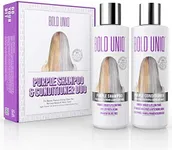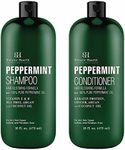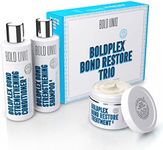Buying Guide for the Best Sodium Lauryl Sulfate Free Shampoo
Choosing a sodium lauryl sulfate (SLS)-free shampoo is a great step if you want a gentler hair care routine. SLS is a common cleansing agent that creates lather but can sometimes be harsh, especially for sensitive scalps, color-treated hair, or those with certain hair types. When picking an SLS-free shampoo, it's important to look beyond just the absence of SLS and consider other factors that affect how the shampoo will work for your hair and scalp. Understanding the key specifications will help you find a product that matches your hair needs and personal preferences.Cleansing AgentsCleansing agents are the ingredients that actually clean your hair by removing dirt and oil. In SLS-free shampoos, these are usually milder alternatives like sodium cocoyl isethionate, decyl glucoside, or coco-glucoside. These gentler cleansers are less likely to strip your hair of natural oils, making them ideal for people with sensitive skin, dry hair, or those who wash their hair frequently. If you have oily hair or use a lot of styling products, you might want a shampoo with slightly stronger but still gentle cleansers. For dry or curly hair, look for the mildest options to avoid dryness or frizz.
Moisturizing IngredientsMoisturizing ingredients like glycerin, aloe vera, or various oils and butters help keep your hair hydrated and soft. These are especially important in SLS-free shampoos, which are often chosen by people with dry, damaged, or curly hair. If your hair tends to be dry or you have a sensitive scalp, look for shampoos with added moisturizers. If your hair is fine or gets oily quickly, you may want a lighter formula with fewer heavy moisturizers to avoid weighing your hair down.
Fragrance and AdditivesFragrance and other additives can make a shampoo more pleasant to use, but they can also cause irritation for some people. If you have a sensitive scalp or allergies, consider a fragrance-free or hypoallergenic shampoo. If you enjoy a pleasant scent, look for shampoos with natural fragrances or essential oils, but be aware that even natural scents can sometimes cause reactions. Always check the ingredient list if you have known sensitivities.
Hair Type SuitabilityShampoos are often formulated for specific hair types, such as curly, straight, fine, thick, color-treated, or damaged hair. Choosing a shampoo that matches your hair type ensures you get the best results. For example, curly or coarse hair benefits from extra moisture, while fine hair needs lightweight formulas. If you color your hair, look for shampoos labeled as color-safe to help preserve your color.
pH BalanceThe pH level of a shampoo affects how gentle it is on your scalp and hair. A pH-balanced shampoo (usually between 4.5 and 5.5) helps maintain the natural acidity of your scalp, which can prevent dryness and irritation. If you have a sensitive scalp or are prone to dandruff, choosing a pH-balanced shampoo can be especially beneficial. Most quality SLS-free shampoos will mention if they are pH-balanced.
















